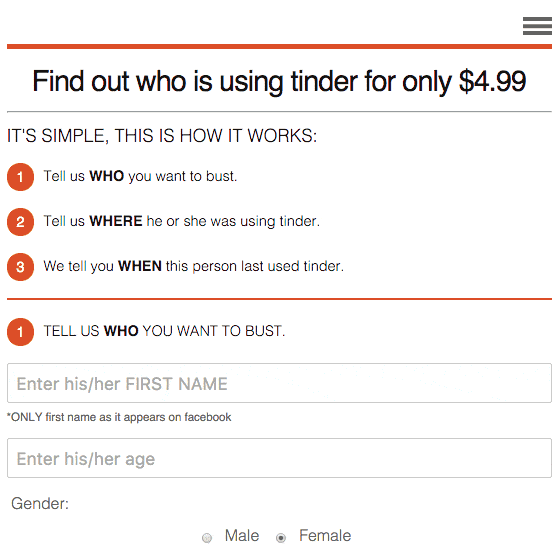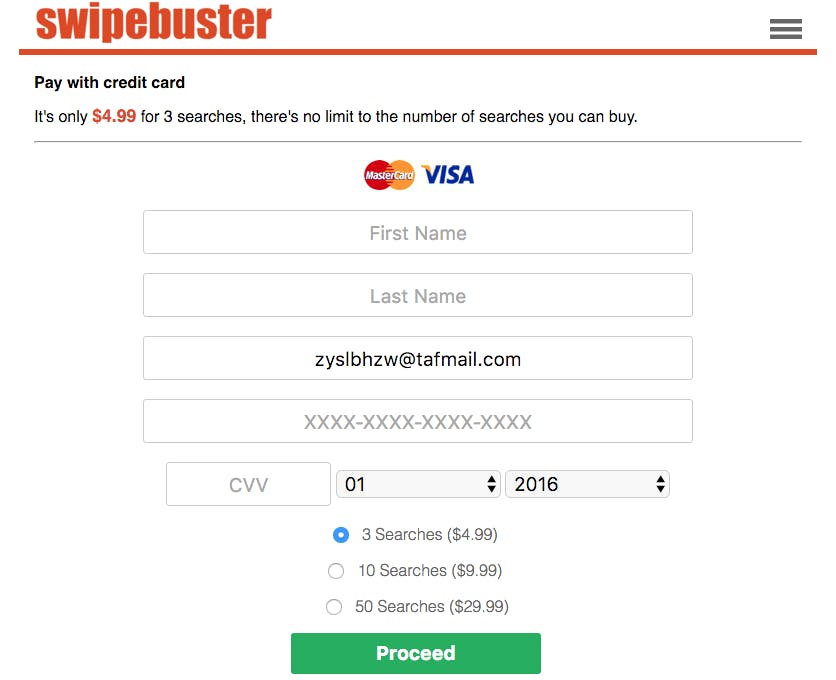A new app, premised on raising awareness about the massive amount of data people share online, is helping out Tinder users for a fee. But it may be considerably less noble than it would like people to believe it to be.
SwipeBuster, previously known as Tinder Buster, is making a splash this week with the promise of helping people search for active Tinder users by name, age, and location. For $4.99, curious (or nosy) people can snag records of up to three people who are using the dating platform.
The search is accomplished by tapping into Tinder’s API and searching the massive database for the relevant information. Tinder has kept its API open, allowing third-party developers to access the user data and build accompanying products that enhance the primary service.
According to an interview SwipeBuster’s creator had with Vanity Fair, the app was invented primarily to out cheaters who are using the app to find a sidepiece.
A survey from GlobalWebIndex suggested that as many as 42 percent of Tinder users are in a relationship and 30 percent are married. Tinder refuted the findings with data of it’s own that found just 1.7 percent of its users are married. The truth assuredly lies somewhere in between, but there are definitely people in relationships swiping in their spare time and SwipeBuster wants to out them—at a cost.
That’s one of many catches that makes SwipeBuster’s posturing as a purity test considerably less pure itself. The proprietor of SwipeBuster told the Daily Dot via email that the purpose of having a fee is “to cap the amount of users using this service to something reasonable.”
There is no actual cap as to how many searches a person can perform; in fact, it actually says on the purchase page “there’s no limit to the number of searches you can buy.” There’s is also an up-sell option, offering 10 searches for $9.99 or 50 searches for $29.99.
SwipeBuster’s creator described the charge as “quite arbitrary” and said is only intended to help cover operating expenses for the site. “It could be much more expensive and a lot of people would probably be willing to pay,” he explained.
He’s undoubtably right about that; many ancillary services for Tinder, including apps like Bonfire and LikeSpy charge more than $5 for in-app purchases that promise everything from more matches to additional insight into the people you find on Tinder.
Those services, though, are for expanding on Tinder’s existing service. SwipeBuster circumvents it under the guise of raising awareness of user privacy. Whether it’s morally “right” to charge people for that lesson is up for debate.
For the service’s creator, the charge is irrelevant, as is how people use the service. There’s no way to assure the people who are being revealed are actually cheaters. When asked about the potential for abuse on the platform—say, a spiteful or abusive ex searching out a former parter—he said that’s a potential risk of every service, including Tinder itself.
“Most people one could make a pretty good map of their daily activities from publicly available info,” he explained. “Who needs the NSA right?” He raised the point that “People have way too much information about themselves available publicly,” and should be aware of the privacy settings on all the services they use. “Hopefully this conversation will remind a significant amount of people of that.”
It’s a fair point—and the crutch on which SwipeBuster leans—despite the fact that there’s also a price tag on it. Just one-in-three Americans took steps to change their privacy strategies online after the revelations brought to light by whistleblower Edward Snowden.
A study by Carnegie Mellon University suggests that people are more likely to make changes to protect their privacy when presented directly with information that shows how often their personal information has been shared, often with their permission, and SwipeBuster would like to piggyback on that premise to present its service as a wake-up call to users.
However, while the site charges to out Tinder users—and not even necessarily cheaters since it’ll provide results for literally anyone on Tinder—the creator of SwipeBuster isn’t interested in making his own identity public. He spoke on the phone to Vanity Fair under the condition of anonymity, and responded to emails only from the “admin” email account registered to the SwipeBuster domain.
“We want the conversation to remain about privacy, not about the story of the guys who came up with an app to get people to talk about privacy,” he explained.
Of course, Swipebuster isn’t the only publicly available tool for revealing personal information. While the site charges $5 to reveal the information of Tinder users, most website registrars charge a similar fee to hide the information of the person purchasing a domain name. The person who purchased swipebuster.com did not spring for that additional cost, so his registration information is readily available online.
When asked if he was indeed the individual listed as the site’s owner in the Whois registry, he opted to neither confirm nor deny it.
There is an incredible amount of information that all internet users happily surrender without a second thought as to where it goes and who might find it. The creator of SwipeBuster may be no exception. We should all be more careful, but that’s a lesson that can be learned for free.
H/T Vanity Fair




